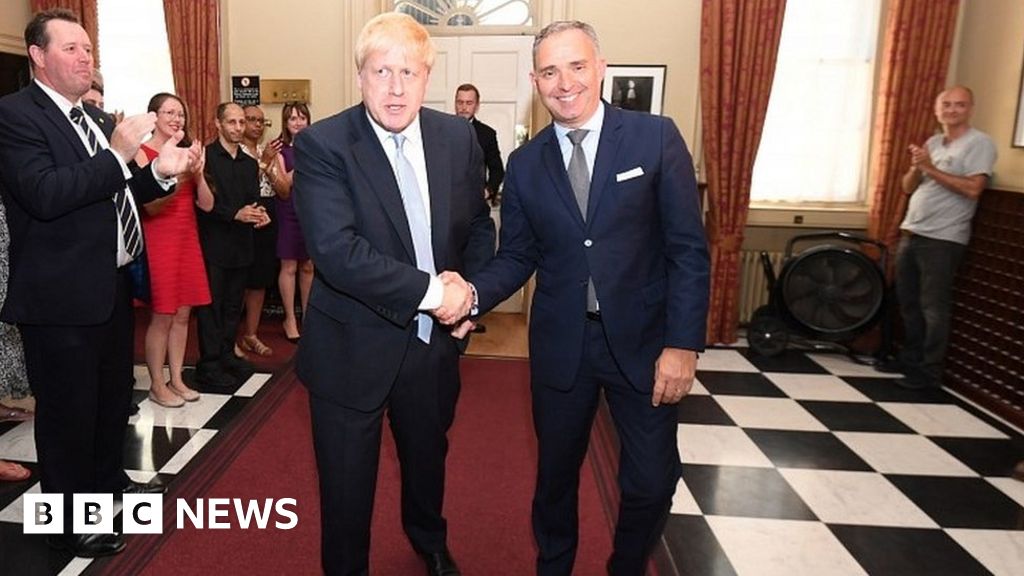
There have been no secrets about the government's ambition to shake up how it does business.
And there has never been any mystery about the desire of the prime minister's top adviser, Dominic Cummings to change Whitehall. What might, perhaps have been rather abstract and hypothetical is becoming real.
Because it doesn't just matter who the politicians are that set the direction of the government. It's not just important who their unelected advisers are, who suggest, cajole and promote their ideas.
But the officials who are charged with carrying out their agendas are crucial, too.
While politicians and governments come and go, the civil service is a constant, impartial organisation that is there to make elected administrations' plans happen, but there to provide advice and stability, too.
The departure of Sir Mark Sedwill matters therefore - the cabinet secretary is the boss of thousands and thousands of civil service, and holds the ultimate responsibility for making the government machine work. And he is the third senior official to have called it quits on Boris Johnson's government.
The former permanent secretary of the Home Office Sir Philip Rutnam left in explosive fashion, giving us an unprecedented statement on a rainy Saturday morning in February.
The top official at the Foreign Office, Sir Simon McDonald, announced his exit at the request of the prime minister only a couple of weeks ago. And now, after some weeks of gossip and speculation, the top official in the civil service has joined the departing ranks.
That leaves only one senior official, the permanent secretary at the Treasury, Sir Tom Scholar, a stable presence out of the government's mandarins.
Sir Mark was trusted by Theresa May. Some Westminster observers were surprised initially therefore when he stayed on in his role when Boris Johnson took over.
There were some eyebrows raised too, when he kept his dual role as national security adviser and boss of the civil service.
Even in more straightforward times, let alone the agonies of the Brexit process and a change of prime minister, each of those jobs would have been more than enough for most mere mortals.
But Sir Mark had, initially, enjoyed good relations with the prime minister's team.
Coronavirus tensions
But the tensions of the coronavirus crisis and Boris Johnson's team's desire for reform have brought his time to an end. It is not yet clear whether he jumped because he was unwilling to pursue the changes the prime minister wishes to make, or whether Mr Johnson's team didn't believe he was up to making the change.
There has been frustration in No 10 at how the Cabinet Office, meant to be the government's power house, performed during the coronavirus crisis. On the other side, there is deep concern in Whitehall circles tonight about how the government perceives the impartial civil service.
But this is not about one person alone. While most people's attention was on the health emergency of the coronavirus crisis, and how the country might start to make its way out of it, the government's published road map included in black and white a very bold indicator of what might come.
You may have read the government document, which focused on how ministers planned to cope with the crisis, and then find a way out.
But I wonder how many really paid heed to this paragraph towards the end of the document?
It said, "As the government navigates towards recovery, it must ensure it learns the right lessons from this crisis and acts now to ensure that governmental structures are fit to cope with a future epidemic, including the prospect of an outbreak of a second epidemic - for example, a pandemic flu - while the government is still responding to Covid-19.
"This will require a rapid re-engineering of government's structures and institutions to deal with this historic emergency and also build new long-term foundations for the UK, and to help the rest of the world."
You can read more of that document for yourself here.
A "rapid re-engineering" of the state is quite the intention. It may send some of Boris Johnson's backers into raptures.
Slimming down
Most experienced civil servants acknowledge that there are things that the system can do better. The coronavirus crisis has forced government to act in ways unimaginable a few months ago.
And it was President Obama's former Chief of Staff, Rahm Emmanuel who expressed the opportunity of seizing a political moment like this when he said, "You never want a serious crisis to go to waste. And what I mean by that is an opportunity to do things that you think you could not do before."
No 10 hopes that slimming down and then super-charging the Cabinet Office will make for a more responsive and more efficient way of doing business. But Whitehall reform can consume the attention and effort of the very people who are charged with making policy happen.
Remodelling the engine does not necessarily change the direction of any government. Politicians are still the ones that hold the wheel. After today's Whitehall drama, the government will hope this week to focus on plans for what happens on the ground, not in SW1.
"Exit" - Google News
June 29, 2020 at 05:09AM
https://ift.tt/3eHr8Px
Sedwill's exit may bring Whitehall reform a step closer - BBC News
"Exit" - Google News
https://ift.tt/2zNkU0N
https://ift.tt/2YrnuUx
Bagikan Berita Ini














0 Response to "Sedwill's exit may bring Whitehall reform a step closer - BBC News"
Post a Comment